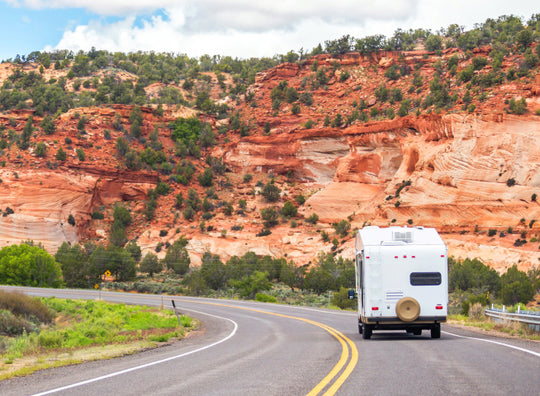Article Content
Written by the Getaway Couple Rae & Jason
Winter is coming, which has many RVers thinking about their RV winter storage solutions. It can be overwhelming learning about all the different ways to prepare your RV for the winter. The internet is full of advice, but it’s not always clear what the best options are for you and your specific situation. That’s why in this article, we discuss RV storage, including the benefits, cost, and essential tips that will make your life easier.
What Is RV Winter Storage?
RV winter storage refers to how you prepare your RV to sit, unused throughout the winter. There are many ways to prepare your RV for its long rest. Some choose to rent or buy an RV storage space, while others store their RV on their property. Whatever you decide to do will depend on the resources available to you, as well as the climate you’re in.
For example, if you can afford a climate-controlled storage unit, your preparation process will be much different than if you’re parking your RV in your backyard. Either way, there are many precautions you can take to avoid a headache when you dust your RV off in the spring.

What Are the Benefits of RV Winter Storage?
When you properly store your RV, you set yourself up for a stress-free camping season. After all, there’s nothing worse than excitedly opening your RV door, only to find a massive leak dripping down your interior wall.
This is the main benefit of RV winter storage: It will save you money in the long run. Yes, you’ll spend some money upfront, but it’ll be far less than the thousands of dollars that extensive water damage will cost you. Storing your RV in the winter will also extend your rig’s life. By taking certain precautions, your tires won’t age as fast, your pipes won’t burst, and your roof won’t leak. RVs are indeed an investment. We must adequately care for them if we want to use them for years to come.
Is It OK to Store a Camper Outside in Winter?
What if you can’t afford an enclosed storage space for your RV? Is it okay to store it outside?
In short, yes. You can store it outside; however, you’ll have to take some extra precautions. When you store your RV outside, it’s at the mercy of the elements. Therefore, it’s essential to consider what types of weather it will experience. For example, if hail is a possibility, storing it under a carport would be ideal. This will reduce the chances of dents and dings from those pesky ice balls.
Remember, you still have to make specific preparations even if you live in a warm climate. If your RV will be exposed to the harsh sun and heat, the best thing you can do is cover it. Never underestimate the power of the sun!
How Much Does RV Winter Storage Cost?
As mentioned before, the cost will be a significant factor influencing how you store your RV. To better understand pricing, let’s break down RV winter storage into two categories: enclosed storage and outdoor storage.
According to storage.com, renting an enclosed storage unit can cost anywhere from $50 to $450+ per month. If you opt for a heated unit, it will most likely fall within the higher price range.
If you decide to store your RV outdoors, most monthly rates range from $30 to $100+. Even if you don’t have to pay rent because you’re keeping it on your property or at a family member’s, the price of storage is not free. Take into account the equipment and supplies you’ll need to winterize and protect your home on wheels.

The Best Tips to Prepare Your RV for Winter Storage
Here are some great tips to help you prepare your RV for the winter. As you read through, remember that the ultimate goal is to prepare your RV for its next adventure. Not only will these tips reduce the chance of unexpected expenses, but you can also hit the road with very few hassles.
Clean the Interior
It sounds simple, but this is perhaps one of the most important precautions you can take when preparing your RV. Not only will you feel relieved in the spring, but cleaning your rig will reduce the chances of mice and other pests making your RV their home. There will also be fewer opportunities for mold growth and odor throughout your RV, making you a much happier camper when you move back in.
Clean the Exterior
Remember all those bugs you hit coming back from your last trip? It’s important to wash away the casualties and other dirt and debris off your rig before winter. The last thing you want is for all the grime to degrade the integrity of the seals and siding. Not only that, but your RV will be nice and shiny when you take it on the road again.
Check and Repair Seals
Inspecting the seals on your RV is a straightforward yet essential action you can take to avoid water damage. It’s imperative to look at both the roof seals and the window and corner seals. If you see any cracked, dry, or missing seals, you can purchase roof caulking and window sealant on Amazon.
Remove Propane Tanks for Outdoor Storage
When storing your RV, remove your propane tanks (if possible). The best practice is to top off your tanks, shut off the valve, and keep them in a safe location.

Pest-Proof Your Camper
Pests are more than just a nuisance; they can potentially wreak havoc on your RV’s wiring. This is why it’s critical to repel mice and other critters from your rig. Not only should you clean up any food that might attract them, but you can also include scents that mice hate. These include ammonia, peppermint oil, cayenne pepper, and cloves. Remember to seal off potential entries with steel wool, as well! If you’re looking for more information on this topic, you can read our article on How To Keep Mice Out of Your RV For Good.
Clean and Dry Canvas Siding or Awnings
For proper RV winter storage, it’s vital to clean and dry your awnings before rolling them up for months. A dirty, wet canvas is a perfect recipe for mold growth!
Winterize Your RV for Outdoor Storage
Once again, consider the weather your RV will experience if you’re storing your RV outdoors. If it faces freezing temperatures, winterize your pipes before that happens. To put it simply, you’ll need to empty all of your RV water lines and run antifreeze through the water system. For a more detailed look at how to winterize your RV, you can find many helpful tutorials on YouTube.
Turn Off Main Breaker and Disconnect Appliances
The last thing you want is to discover drained batteries when you open your RV in the spring. Disconnecting appliances that might draw power will prevent that. Most RVs have a main breaker or power switch you can turn off as well, ensuring fully charged batteries when you need them.
Remove Batteries for RV Winter Storage
If your RV will experience freezing temperatures, remove the batteries altogether and store them somewhere warm. Batteries can experience permanent damage if they sit without use in freezing temperatures.

Leave Drawers, Cupboards, and Interior Doors Open
What are some of the first places in your RV that will experience mold growth? Cupboards, closets, and drawers. As an extra precaution, leave these interior compartments open; they’ll be less likely to encounter moisture and mold growth.
Top Off Fluids and Use Fuel Stabilizer in Motorhomes
If you have a motorhome or a van, it’s essential to top off all of your fluids. You’ll prevent moisture buildup by filling up your gas tank, radiator, and other fluids. Moreover, adding a fuel stabilizer will keep your gas from going bad.
Inflate and Cover Tires for RV Winter Storage
Exposure to the elements is a major cause of tire wear in RVs. To avoid this unnecessary deterioration, cover your tires when you’re not using your rig. Proper coverage will prevent dryness and cracking and extend their life on the road. It’s crucial to inflate them, as well, since cold temperatures will inevitably decrease your tires’ air pressure.
Cover with High-Quality RV Cover
Last, but not least, cover your rig. This is especially important if you’ll store your RV outside. A good quality, waterproof cover will protect it from water damage, leaves and other debris, pests, and anything else that might scratch or damage your rig.

Get Your RV Ready for Winter
RV winter storage will look a little different for everyone depending on the resources at your disposal. For example, if you can park your RV in your backyard, you’ll save money on rental costs. Still, you’ll need to purchase the necessary equipment to protect it from the elements, pests, and other potential mishaps.
On the other hand, if you opt for an enclosed, heated storage unit, you’ll surely pay more upfront. However, you won’t necessarily have to purchase an RV cover, antifreeze, or tire covers. Not only that, but you’ll have peace of mind knowing your RV has a good home for the winter. What you decide to do depends on your situation, the climate you’re in, and your travel style!









